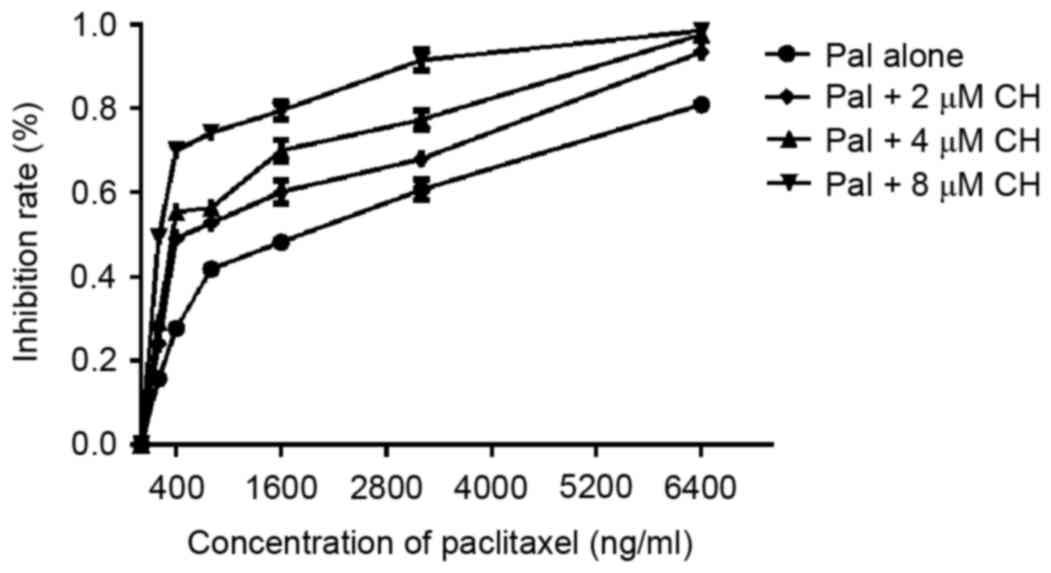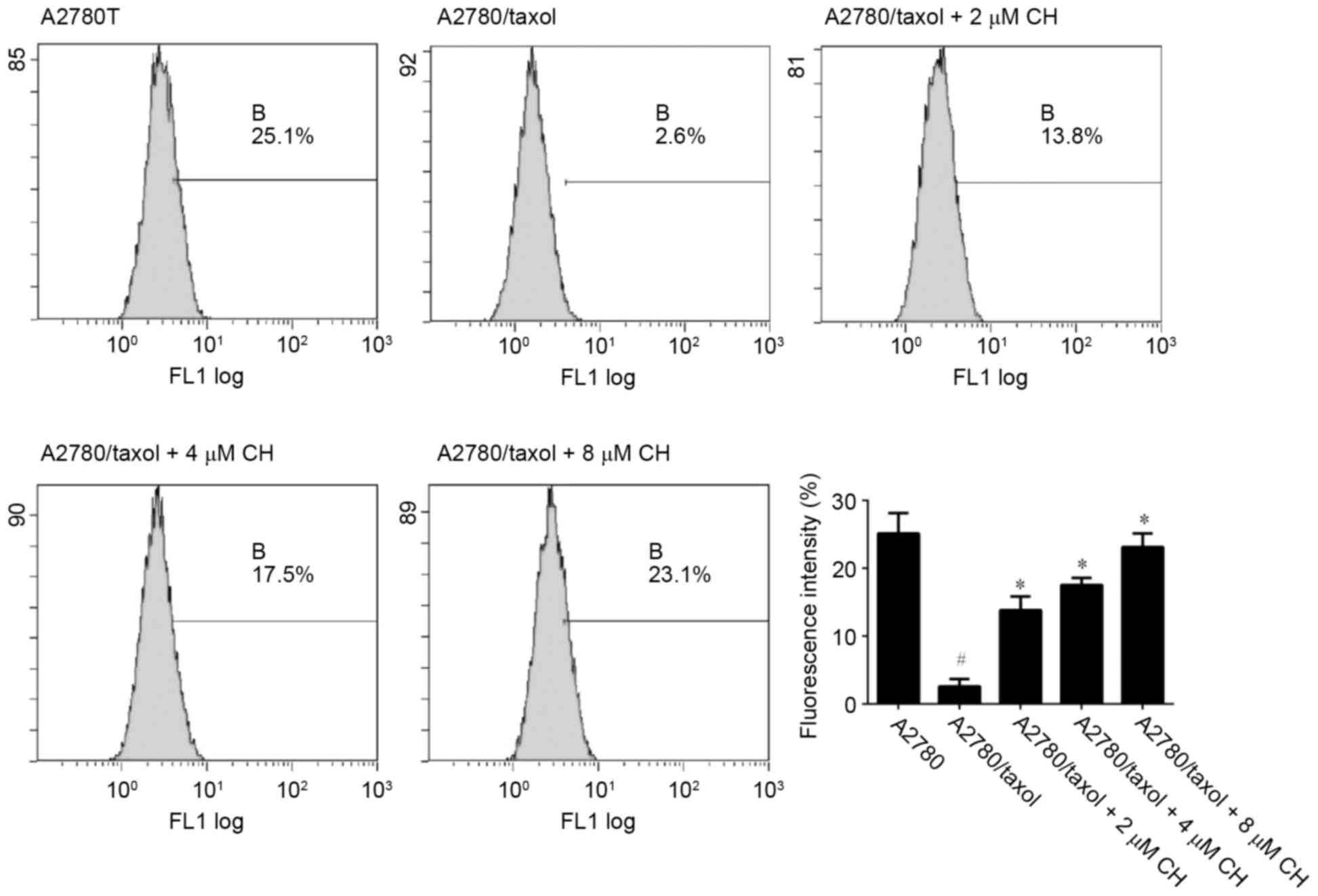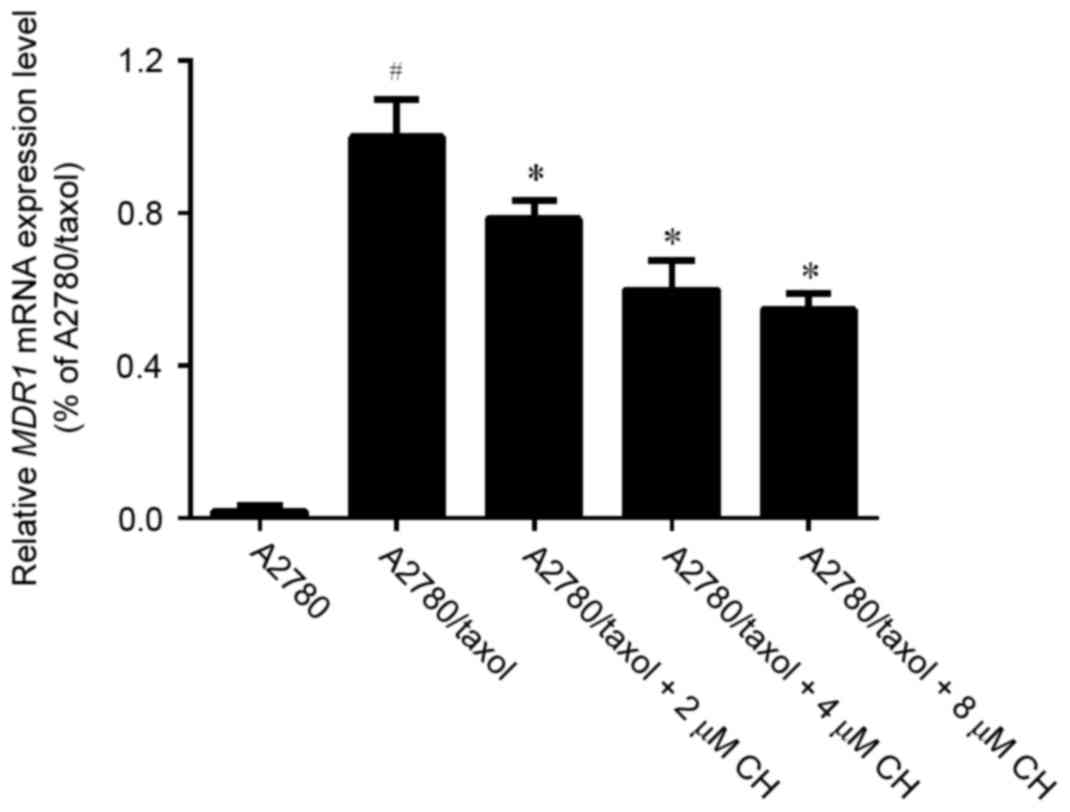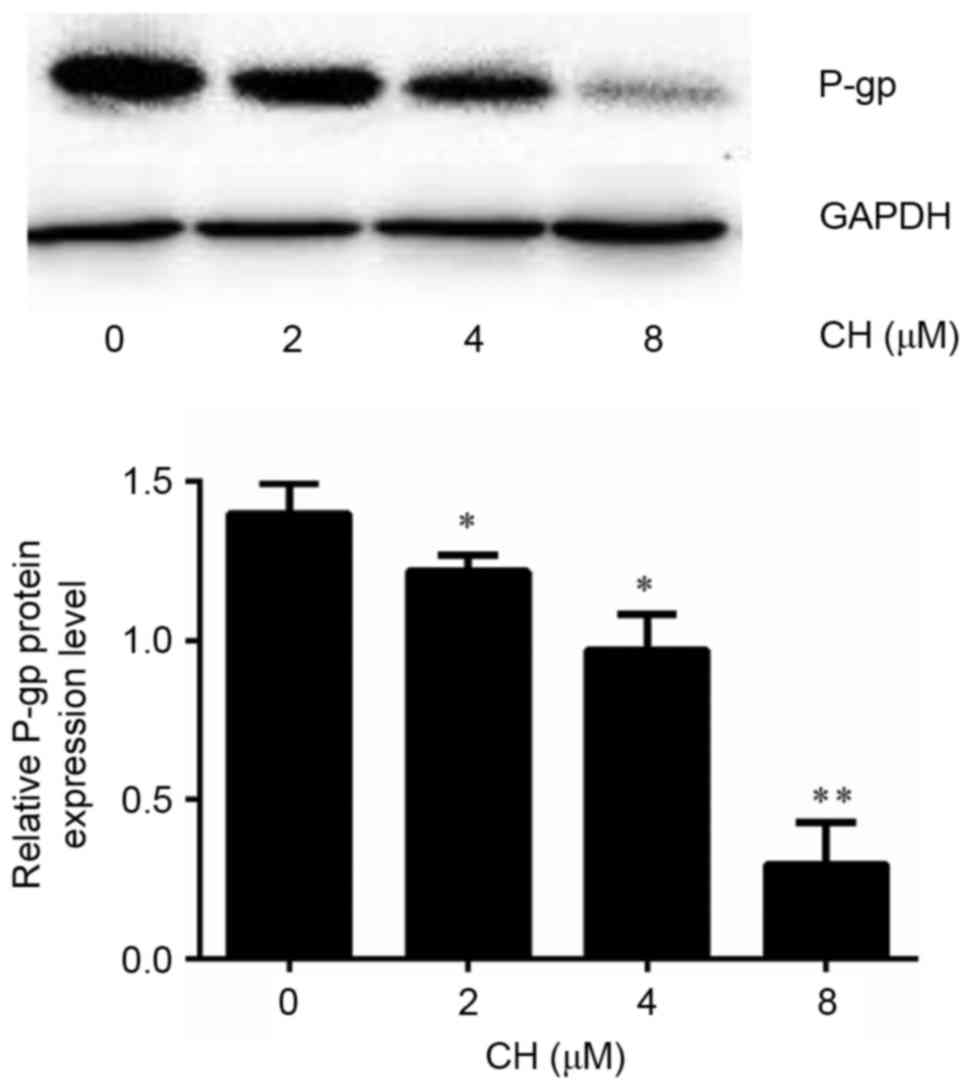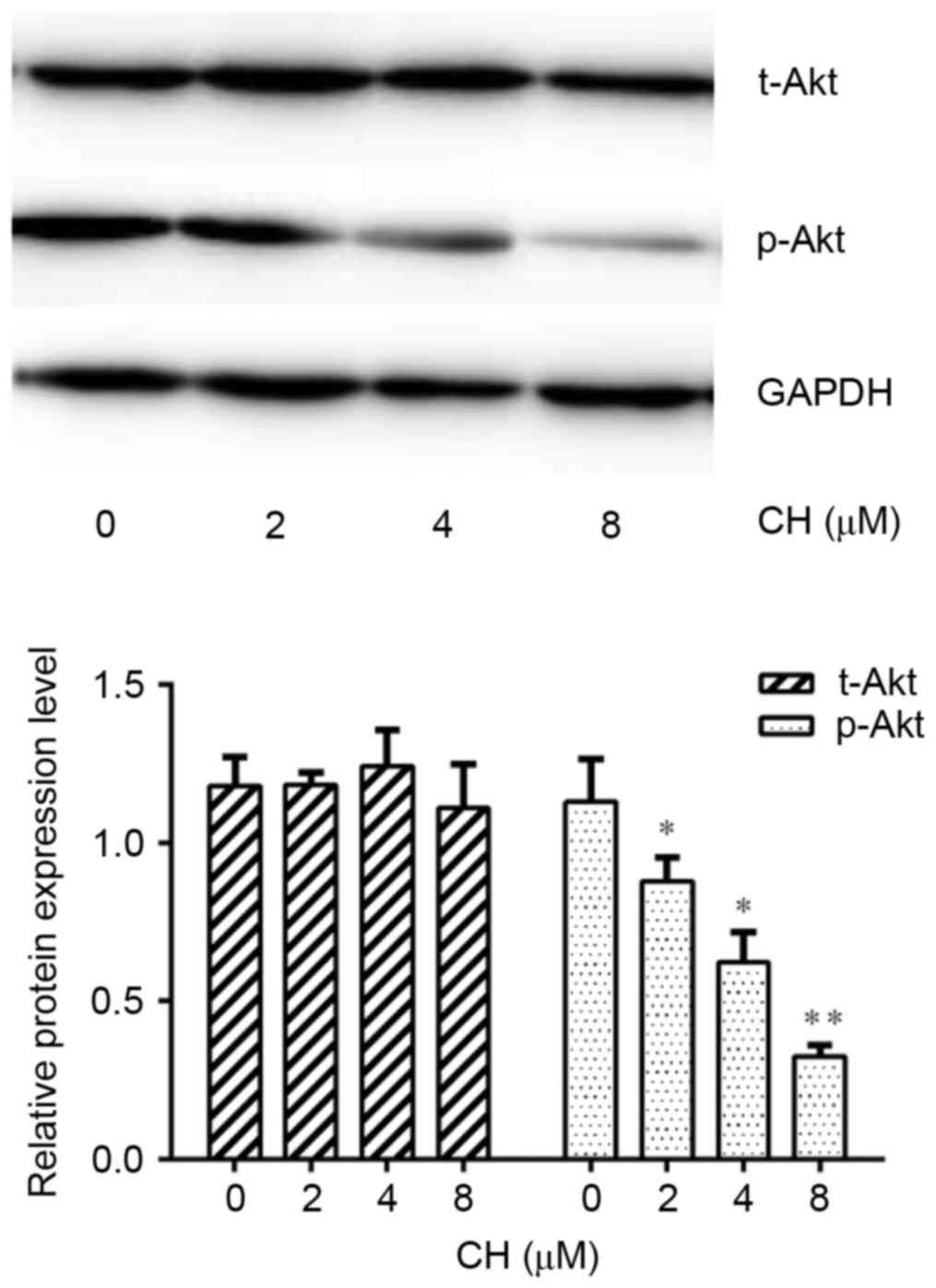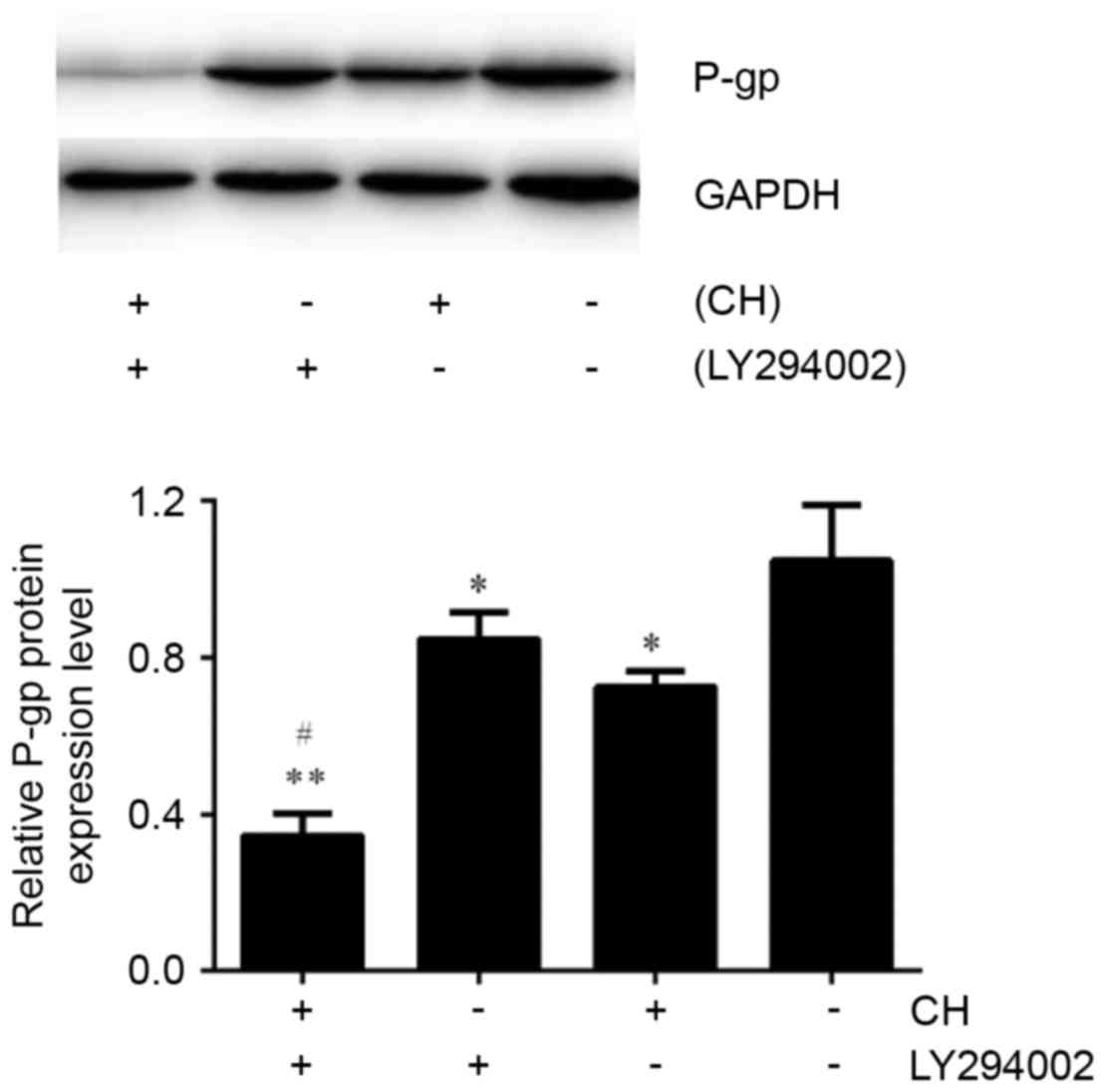|
1
|
Siegel RL, Miller KD and Jemal A: Cancer
statistics, 2016. CA Cancer J Clin. 66:7–30. 2016. View Article : Google Scholar : PubMed/NCBI
|
|
2
|
Webb PM and Jordan SJ: Epidemiology of
epithelial ovarian cancer. Best Pract Res Clin Obstet Gynaecol.
41:3–14. 2017. View Article : Google Scholar : PubMed/NCBI
|
|
3
|
Zahreddine H and Borden KL: Mechanisms and
insights into drug resistance in cancer. Front Pharmacol. 4:282013.
View Article : Google Scholar : PubMed/NCBI
|
|
4
|
Gottesman MM: Mechanisms of cancer drug
resistance. Annu Rev Med. 53:615–627. 2002. View Article : Google Scholar : PubMed/NCBI
|
|
5
|
Gillet JP and Gottesman MM: Mechanisms of
multidrug resistance in cancer. Methods Mol Biol. 596:47–76. 2010.
View Article : Google Scholar : PubMed/NCBI
|
|
6
|
Zhang H, Wang J, Cai K, Jiang L, Zhou D,
Yang C, Chen J, Chen D and Dou J: Downregulation of gene MDR1 by
shRNA to reverse multidrug-resistance of ovarian cancer A2780
cells. J Cancer Res Ther. 8:226–231. 2012. View Article : Google Scholar : PubMed/NCBI
|
|
7
|
Li Z, Hu S, Wang J, Cai J, Xiao L, Yu L
and Wang Z: MiR-27a modulates MDR1/P-glycoprotein expression by
targeting HIPK2 in human ovarian cancer cells. Gynecol Oncol.
119:125–130. 2010. View Article : Google Scholar : PubMed/NCBI
|
|
8
|
Zhao BX, Sun YB, Wang SQ, Duan L, Huo QL,
Ren F and Li GF: Grape seed procyanidin reversal of P-glycoprotein
associated multi-drug resistance via down-regulation of NF-κB and
MAPK/ERK mediated YB-1 activity in A2780/T cells. PLoS One.
8:e710712013. View Article : Google Scholar : PubMed/NCBI
|
|
9
|
Han L, Wang Y, Guo X, Zhou Y, Zhang J,
Wang N, Jiang J, Ma F and Wang Q: Downregulation of MDR1 gene by
cepharanthine hydrochloride is related to the activation of
c-Jun/JNK in K562/ADR cells. BioMed Res Int. 2014:1643912014.
View Article : Google Scholar : PubMed/NCBI
|
|
10
|
O'Neill AJ, Prencipe M, Dowling C, Fan Y,
Mulrane L, Gallagher WM, O'Connor D, O'Connor R, Devery A, Corcoran
C, et al: Characterisation and manipulation of docetaxel resistant
prostate cancer cell lines. Mol Cancer. 10:1262011. View Article : Google Scholar : PubMed/NCBI
|
|
11
|
Misra S, Ghatak S and Toole BP: Regulation
of MDR1 expression and drug resistance by a positive feedback loop
involving hyaluronan, phosphoinositide 3-kinase, and ErbB2. J Biol
Chem. 280:20310–20315. 2005. View Article : Google Scholar : PubMed/NCBI
|
|
12
|
Mao Z, Zhou J, Luan J, Sheng W, Shen X and
Dong X: Tamoxifen reduces P-gp-mediated multidrug resistance via
inhibiting the PI3K/Akt signaling pathway in ER-negative human
gastric cancer cells. Biomed Pharmacother. 68:179–183. 2014.
View Article : Google Scholar : PubMed/NCBI
|
|
13
|
Deferme S, Van Gelder J and Augustijns P:
Inhibitory effect of fruit extracts on P-glycoprotein-related
efflux carriers: An in-vitro screening. J Pharm Pharmacol.
54:1213–1219. 2002. View Article : Google Scholar : PubMed/NCBI
|
|
14
|
Tomita M, Fujitani K and Aoyagi Y:
Synthesis of dl-cepharanthine. Tetrahedron Lett. 13:1201–1206.
1967. View Article : Google Scholar : PubMed/NCBI
|
|
15
|
Nakajima A, Yamamoto Y, Taura K, Hata K,
Fukumoto M, Uchinami H, Yonezawa K and Yamaoka Y: Beneficial effect
of cepharanthine on overcoming drug-resistance of hepatocellular
carcinoma. Int J Oncol. 24:635–645. 2004.PubMed/NCBI
|
|
16
|
Ikeda R, Che XF, Yamaguchi T, Ushiyama M,
Zheng CL, Okumura H, Takeda Y, Shibayama Y, Nakamura K, Jeung HC,
et al: Cepharanthine potently enhances the sensitivity of
anticancer agents in K562 cells. Cancer Sci. 96:372–376. 2005.
View Article : Google Scholar : PubMed/NCBI
|
|
17
|
Li H, Yan Z, Ning W, Xiao-Juan G, Cai-Hong
Z, Jin-Hua J, Fang M and Qing-Duan W: Using rhodamine 123
accumulation in CD8 cells as a surrogate indicator to study the
P-glycoprotein modulating effect of cepharanthine hydrochloride in
vivo. J Biomed Biotechnol. 2011:2816512011. View Article : Google Scholar : PubMed/NCBI
|
|
18
|
Peng YM, Wang N, Wang YF, Han L, Zhang Y,
Jiang JH, Zhou YB and Wang QD: Correlation between reversing effect
of cepharanthine hydrochloride on multidrug resistance and
P-glycoprotein expression and function of K562/ADR cells. Yao Xue
Xue Bao. 47:594–599. 2012.(In Chinese). PubMed/NCBI
|
|
19
|
Schmittgen TD and Livak KJ: Analyzing
real-time PCR data by the comparative C(T) method. Nat Protoc.
3:1101–1108. 2008. View Article : Google Scholar : PubMed/NCBI
|
|
20
|
Goldman B: Multidrug resistance: Can new
drugs help chemotherapy score against cancer? J Natl Cancer Inst.
95:255–257. 2003. View Article : Google Scholar : PubMed/NCBI
|
|
21
|
Dean M, Rzhetsky A and Allikmets R: The
human ATP-binding cassette (ABC) transporter superfamily. Genome
Res. 11:1156–1166. 2001. View Article : Google Scholar : PubMed/NCBI
|
|
22
|
Schinkel AH and Jonker JW: Mammalian drug
efflux transporters of the ATP binding cassette (ABC) family: An
overview. Adv Drug Deliv Rev. 55:3–29. 2003. View Article : Google Scholar : PubMed/NCBI
|
|
23
|
Eckford PDW and Sharom FJ: ABC efflux
pump-based resistance to chemotherapy drugs. Chem Rev.
109:2989–3011. 2009. View Article : Google Scholar : PubMed/NCBI
|
|
24
|
Binkhathlan Z and Lavasanifar A:
P-glycoprotein inhibition as a therapeutic approach for overcoming
multidrug resistance in cancer: Current status and future
perspectives. Curr Cancer Drug Targets. 13:326–346. 2013.
View Article : Google Scholar : PubMed/NCBI
|
|
25
|
Krishna R and Mayer LD: Multidrug
resistance (MDR) in cancer. Mechanisms, reversal using modulators
of MDR and the role of MDR modulators in influencing the
pharmacokinetics of anticancer drugs. Eur J Pharm Sci. 11:265–283.
2000. View Article : Google Scholar : PubMed/NCBI
|
|
26
|
Lampidis TJ, Krishan A, Planas L and
Tapiero H: Reversal of intrinsic resistance to adriamycin in normal
cells by verapamil. Cancer Drug Deliv. 3:251–259. 1986. View Article : Google Scholar : PubMed/NCBI
|
|
27
|
Alaoui-Jamali MA, Schecter RL, Rustum YM,
Centurioni MG, Lehnert S and Batist G: In vivo reversal of
doxorubicin resistance by a new tiapamil analog Ro11-2933. J
Pharmacol Exp Ther. 264:1299–1304. 1993.PubMed/NCBI
|
|
28
|
Boesch D, Muller K, Pourtier-Manzanedo A
and Loor F: Restoration of daunomycin retention in
multidrug-resistant P388 cells by submicromolar concentrations of
SDZ PSC 833, a nonimmunosuppressive cyclosporin derivative. Exp
Cell Res. 196:26–32. 1991. View Article : Google Scholar : PubMed/NCBI
|
|
29
|
Martin C, Berridge G, Mistry P, Higgins C,
Charlton P and Callaghan R: The molecular interaction of the high
affinity reversal agent XR9576 with P-glycoprotein. Br J Pharmacol.
128:403–411. 1999. View Article : Google Scholar : PubMed/NCBI
|
|
30
|
Abraham J, Edgerly M, Wilson R, Chen C,
Rutt A, Bakke S, Robey R, Dwyer A, Goldspiel B, Balis F, et al: A
phase I study of the P-glycoprotein antagonist tariquidar in
combination with vinorelbine. Clin Cancer Res. 15:3574–3582. 2009.
View Article : Google Scholar : PubMed/NCBI
|
|
31
|
Biswas KK, Tancharoen S, Sarker KP,
Kawahara K, Hashiguchi T and Maruyama I: Cepharanthine triggers
apoptosis in a human hepatocellular carcinoma cell line (HuH-7)
through the activation of JNK1/2 and the downregulation of Akt.
FEBS Lett. 580:703–710. 2006. View Article : Google Scholar : PubMed/NCBI
|
|
32
|
Okamoto M, Ono M and Baba M: Suppression
of cytokine production and neural cell death by the
anti-inflammatory alkaloid cepharanthine: A potential agent against
HIV-1 encephalopathy. Biochem Pharmacol. 62:747–753. 2001.
View Article : Google Scholar : PubMed/NCBI
|
|
33
|
Zhou YB, Wang YF, Zhang Y, Zheng LY, Yang
XA, Wang N, Jiang JH, Ma F, Yin DT, Sun CY, et al: In vitro
activity of cepharanthine hydrochloride against clinical wild-type
and lamivudine-resistant hepatitis B virus isolates. Eur J
Pharmacol. 683:10–15. 2012. View Article : Google Scholar : PubMed/NCBI
|
|
34
|
Seubwai W, Vaeteewoottacharn K, Hiyoshi M,
Suzu S, Puapairoj A, Wongkham C, Okada S and Wongkham S:
Cepharanthine exerts antitumor activity on cholangiocarcinoma by
inhibiting NF-kappaB. Cancer Sci. 101:1590–1595. 2010. View Article : Google Scholar : PubMed/NCBI
|
|
35
|
Asaumi J, Nishikawa K, Matsuoka H, Iwata
M, Kawasaki S, Hiraki Y and Nishijima K: Direct antitumor effect of
cepharanthin and combined effect with adriamycin against Ehrlich
ascites tumor in mice. Anticancer Res. 15:67–70. 1995.PubMed/NCBI
|
|
36
|
Wu J, Suzuki H, Akhand AA, Zhou YW,
Hossain K and Nakashima I: Modes of activation of mitogen-activated
protein kinases and their roles in cepharanthine-induced apoptosis
in human leukemia cells. Cell Signal. 14:509–515. 2002. View Article : Google Scholar : PubMed/NCBI
|
|
37
|
Enokida H, Gotanda T, Oku S, Imazono Y,
Kubo H, Hanada T, Suzuki S, Inomata K, Kishiye T, Tahara Y, et al:
Reversal of P-glycoprotein-mediated paclitaxel resistance by new
synthetic isoprenoids in human bladder cancer cell line. Jpn J
Cancer Res. 93:1037–1046. 2002. View Article : Google Scholar : PubMed/NCBI
|
|
38
|
Mukai M, Che XF, Furukawa T, Sumizawa T,
Aoki S, Ren XQ, Haraguchi M, Sugimoto Y, Kobayashi M, Takamatsu H,
et al: Reversal of the resistance to STI571 in human chronic
myelogenous leukemia K562 cells. Cancer Sci. 94:557–563. 2003.
View Article : Google Scholar : PubMed/NCBI
|
|
39
|
Zhao HF, Wang J and To Tony SS: The
phosphatidylinositol 3-kinase/Akt and c-Jun N-terminal kinase
signaling in cancer: Alliance or contradiction? (Review). Int J
Oncol. 47:429–436. 2015.PubMed/NCBI
|
|
40
|
Chen JR, Jia XH, Wang H, Yi YJ, Wang JY
and Li YJ: Timosaponin A-III reverses multi-drug resistance in
human chronic myelogenous leukemia K562/ADM cells via
downregulation of MDR1 and MRP1 expression by inhibiting PI3K/Akt
signaling pathway. Int J Oncol. 48:2063–2070. 2016. View Article : Google Scholar : PubMed/NCBI
|
|
41
|
Gao AM, Ke ZP, Wang JN, Yang JY, Chen SY
and Chen H: Apigenin sensitizes doxorubicin-resistant
hepatocellular carcinoma BEL-7402/ADM cells to doxorubicin via
inhibiting PI3K/Akt/Nrf2 pathway. Carcinogenesis. 34:1806–1814.
2013. View Article : Google Scholar : PubMed/NCBI
|















